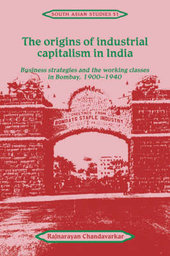
|
The Origins of Industrial Capitalism in India: Business Strategies and the Working Classes in Bombay, 1900-1940
Hardback
Main Details
Description
Rajnarayan Chandavarkar presents the first major study of the relationship between labour and capital in India's economic development in the early twentieth-century. He explores the emergence of capitalism in the region, the development of the cotton textile industry, its particular problems in the 1920s and 1930s and the mill owners' and the state's responses to them. The author also investigates how a labour force was formed in Bombay - its rural roots, urban networks, industrial organisation and the way in which it shaped capitalist strategies. In a subject dominated by the assumption of unities, Rajnarayan Chandavarkar convincingly demonstrates the fragmentation of class, on the side of both capital and labour. Their interaction sometimes exacerbated their internal differences. But, the author also asks on what terms, to what ends, and under what circumstances solidarities could be forged between workers.
Reviews"It is a rich, complex, interactive, and fearsomely variable world of labor through which the author skillfully leads us...What makes this an excellent history is the degree of detail incorporated into his story which so enriches its telling...One can almost feel the heat and pulse of living human beings. Such anchoring in life makes history more than theories and analyses which appear to 'manage' the past and protect us from 'over' generalization. At the same time, the author has drawn sound conclusions from analyses based on an impressive foundation of primary source materials...a superb study of an example of industrial development during the first half of this century. Chandavarkar has written a masterful history." George E. Moore, The Historian "Rajnarayan Chandavarkar's book furthers our understanding of the evolution of Bombay from an insignificant settlement on swampy, inhospitable islands to its current position as the financial capital of India." American Historical Review "This is a work of great erudition." Reviews of Books
|